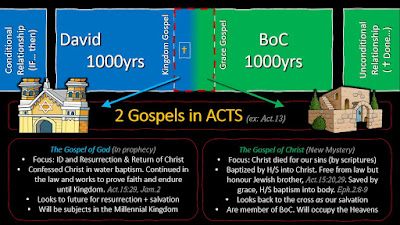Paul, The First into a New Program
Paul, The First into a New Program

It is incredibly important to understand God's Word in the right context, and this is greatly supported by identifying periods of time, being aware of patterns or nuances, recognizing people groups and changes in program or instruction throughout the Bible. The example below is one such instance where, based on what Paul says, "that IN ME first...as a pattern...", it could be a bit confusing what he means by it! We have to dig in deeper and analyze why Paul said this and understand it in context with right division in the Word.
A very interesting scripture to analyze in regard to the divisions within the Word is,
1 Timothy 1:15-16 It is a faithful saying and worthy of all acceptance that Christ Jesus came into the world to save sinners, of whom I am chief [foremost]. But for this reason, I obtained mercy, in order that in me first, Christ Jesus might show all patience [longsuffering, grace] as a pattern to those who are going to believe on Him for everlasting life.
Paul says he was the "first"? The first of what?
Surely he does not mean he was the first to receive mercy from God, or the first to be saved? No! Many people had come to be in right standing with God before Paul. So, what does he mean?
In the context of the verse, and considering that Israel had been blinded (Rom.11:7, 2 Cor.3:14) and God had started a new dispensation through Paul (Gal.2:7-8), this statement, "in me first", means that Paul became the first person into a new people group; the first person as member of the Body of Christ.
Then Paul continues the statement by saying, "as a pattern". What pattern, and for who?
Well again, we need to know the context of this verse within the greater setting of God's plan. This statement is speaking of a new program; a program of grace, a pattern of salvation by grace without works (Eph.2:8-9), and it applies to Paul and all who are going to (or in other words, from this point forward) believe on Christ according to this grace pattern. Who is that you might ask? Well, that’s you and I, believers in Christ according to grace without works, the body of Christ up until the catching away of the rapture.
Just to wrap up on this position that Paul speaks over himself, let's briefly look at some other scripture that supports this statement. In themselves, these three scriptures are quite radical statements, but as per usual, they are completely justified in the context of understanding the divisions in the Word and that through Paul we have entered into the dispensation (or division) of grace.
The first scriptures that supports the above verse is,
1 Corinthians 4:15 For though you might have ten thousand instructors in Christ, yet you do not have many fathers; for in Christ Jesus I have begotten [created] you through the gospel.
Paul says, "I have begotten you through the gospel.". This gospel is Paul's gospel, the gospel of grace (Acts 20:24) which is different to the Kingdom gospel taught by Jesus and the 12 Apostles. Because this is a new gospel for a new dispensation, the converts (begotten of Paul) who are saved by this new gospel (of whom Paul was the first) are saved into a new program and into the Body of Christ.
The next verse emphasizing the divisions in God's plan is,
1 Corinthians 3:10-11 According to the grace of God which was given to me, as a wise master builder I have laid the foundation [of a new gospel and doctrine], and another builds on it. 11 For no other foundation can anyone lay than that which is laid, which is Jesus Christ.
Similar to the verse above, Paul again identified himself as the one who lays the foundation of doctrine for this new program of grace. It makes sense that he is the master builder since he has the blueprints of the grace program. Just have a look at this scripture to prove it,
Ephesians 3:2-5 If ye have heard of the dispensation of the grace of God which is given me to youward: 3 How that by revelation He made known unto me the mystery; (as I wrote afore in few words, 4 Whereby, when ye read, ye may understand my knowledge in the mystery of Christ) 5 Which in other ages was not made known unto the sons of men, as it is now revealed unto his holy apostles and prophets by the Spirit;
Can you see why Paul is the foundation layer of this new program. The glorified risen Christ gave to Paul the blueprint to lay the foundation (which is Christ and His cross work) and Paul gives us the opportunity to build upon this foundation. It is up to us to build it up correctly, rightly divided!!
The last scripture example that provides evidence of a division starting with Paul is,
2 Timothy 4:17-18 But the Lord stood with me and strengthened me, so that the message might be preached fully through me, and that all the Gentiles might hear. Also, I was delivered out of the mouth of the lion. 18 And the Lord will deliver me from every evil work and preserve me for His heavenly kingdom. To Him be glory forever and ever. Amen!
Paul writes this to Timothy at the very end of his ministry referring to a heavenly kingdom. But before Paul became the Apostle of the Gentiles, he was a devout and highly fervent Pharisee. The Pharisee sect believed in the resurrection and knew full well of the promised earthly kingdom, the inheritance of the Jews. So, for Paul to have changed his fundamental beliefs to now say that God would preserve him for His heavenly kingdom is a radical thing to say. This can only account for a radical change of program, which again confirms the importance of understanding Word from a rightly divided context. By the way, just to understand, salvation for the Jews was not about going to heaven. They would inherit the earth!



Comments
Post a Comment